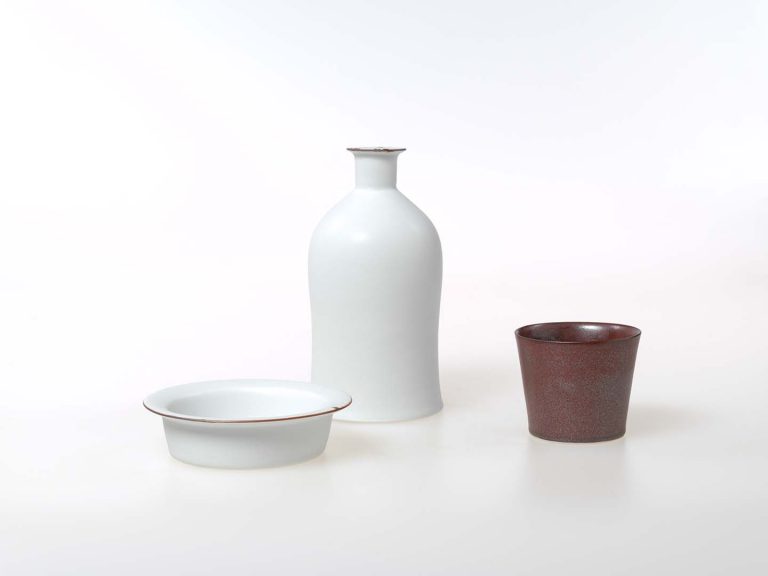We acknowledge the Traditional Owners of the land on which the Queensland Art Gallery | Gallery of Modern Art stands and recognise the creative contribution First Australians make to the art and culture of this country.

Kirsten Coelho / Denmark/Australia b.1966 / Abide 2018 / Porcelain, matte white celadon glaze, iron oxide / Three pieces: 21 x 29 x 22cm (overall) / Purchased 2019. Andrew and Lilian Pedersen Trust / Collection: Queensland Art Gallery | Gallery of Modern Art / © Kirsten Coelho
Kirsten CoelhoAbide 2018
Not Currently on Display
Kirsten Coelho’s practice has primarily focussed in the production of individual objects, although in recent years this has evolved to the occasional installation and more commonly the production of small composed groupings of vessels — Abide being a prime example of this direction.
Interestingly, Coelho takes some liberty in developing her porcelain forms. They are not always slavish imitations of typical enamelware forms, but often translations of many different domestic vessels from gin bottles to medicine jars, oil cans to bowls and beakers as if they were produced in enamelware. This fluid selection of forms has a significance beyond an appetite for experimentation.
This play between materials and appearances also, quite intelligently, recalls the routine wear of toil and the passing of time. Certainly, with their matt celadon surfaces, which often show translucent pale blue tones, works such as Abide cast an ethereal presence of yesteryear.
Kirsten Coelho was born in Denmark in 1966. She trained at the South Australian School of Art from 1984-88, before relocating to the UK to work as a studio potter. She returned to Adelaide in 1998, completing her Masters in 2004 again at the South Australian School of Art.
In 2012 Coelho was Winner [Australia] of the prestigious Sidney Myer Fund Australian Ceramic Award, Shepparton Art Museum, Victoria, and in 2005 was winner of the Josephine Ulrick Ceramic Art Award for excellence. Coelho has also been the recipient of three Australia Council for the Arts and three ArtsSA New Work Development grants.
Coelho’s fine porcelain renderings of nineteenth and early twentieth-century enamelware draw inspiration from Australian colonial paintings, as well as the work of Danish painter Vilhelm Hammershøi. Her work honours pioneers of Australia who endured harsh living conditions, particularly when measured against present-day standards of consumption and comfort.